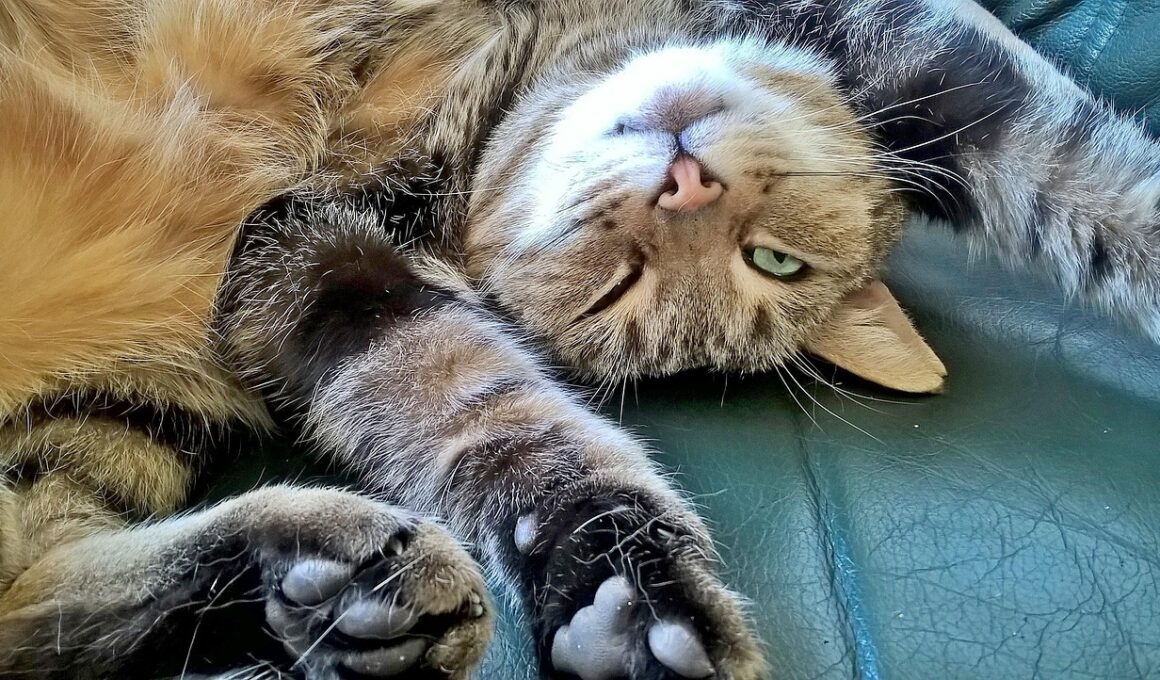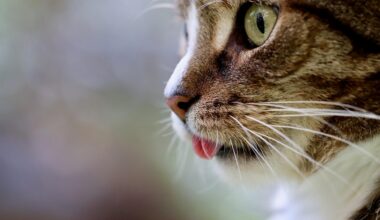How Stress Can Influence Bacterial Infection Susceptibility in Cats
Stress in cats is frequently associated with behavioral changes, impacting their overall health. When a cat experiences stress, its body reacts by releasing hormones such as cortisol. This heightened state can suppress the immune system, making the cat more vulnerable to bacterial infections. Furthermore, stress can provoke underlying health issues that cats may already be facing. Environmental changes, such as moving to a new home or the introduction of new pets, can exacerbate stress levels. In turn, this anxiety can disturb regular eating habits and sleep patterns, leading to further susceptibility to diseases. Understanding stressors is crucial in maintaining a cat’s health. By identifying specific triggers, cat owners can implement effective strategies to reduce stress. This includes creating safe spaces within the home, utilizing calming pheromones, and maintaining a consistent routine. Proper socialization is also essential for helping cats cope with change. Investing time in observing a cat’s behavior can yield insights into their emotional state, enabling owners to take proactive measures in their care.
Impact of Stress on the Immune System
The immune system of a cat plays a vital role in defending against infections. Stress can hinder the immune response, increasing the likelihood of infections occurring. When cats are under persistent stress, cortisol levels rise, leading to a weakened immune function. This reduction in immune response can delay recovery from illnesses, as the body is unable to effectively fight off bacteria and other pathogens. Moreover, inflammatory responses may become unbalanced, further complicating health outcomes. A thorough understanding of this connection helps caregivers take preventive measures. Providing mental stimulation and enrichment can help mitigate stress levels. Engaging in playtime, offering puzzle feeders, and ensuring quality interactions promote a healthier, happier feline. Moreover, regular veterinary check-ups can help catch any potential issues early before stress exacerbates them. Cats thrive in environments that reduce anxiety, and as a result, they are less likely to experience health complications. In conclusion, recognizing the signs of stress can significantly alter a cat’s vulnerability to bacterial infections. Owners should prioritize their cat’s mental well-being.
When cats are stressed, they may exhibit various signs that indicate their discomfort. Common signs include excessive grooming, loss of appetite, and behavioral changes like aggression or hiding. Owners must become familiar with these indicators as they can serve as a warning to intervene promptly. Cats are notorious for concealing pain or stress, adding another layer of complexity for their caregivers. Thus, ensuring a stable environment is essential to decrease stress. Consistency in feeding times, play, and affection can vastly improve a cat’s emotional health. Furthermore, creating vertical spaces allows cats to feel secure and escape any perceived threats. These spaces can include cat trees or shelves to give them their ‘safe zone.’ Social stressors can also arise from interactions with other pets or humans. A gradual introduction to new companions can ease this transition and decrease anxiety. Additionally, using calming aids can provide extra support during high-stress situations, such as travel or vet visits. Identifying and managing stressors empowers pet owners to take charge of their feline’s health.
Feline bacterial infections are commonly seen in stressed cats due to their compromised immune systems. Conditions such as urinary tract infections and respiratory infections can frequently arise in anxiety-prone felines. Regularly monitor your cat’s behavior and health, paying close attention to any changes, especially after stressful events. If your cat shows signs of illness, immediate veterinary attention may be needed. Moreover, be aware that prevention plays a critical role in safeguarding against these infections. Vaccinations can help protect against certain bacterial diseases, while good hygiene practices minimize exposure to harmful pathogens. For instance, ensuring clean litter boxes and food bowls can mitigate the risk of bacterial infections. Additionally, providing ample fresh water encourages hydration, which is essential for maintaining urinary health. Owners should also consider the quality of food in their cat’s diet—nutritional deficiencies may also lead to weakened immune responses. By maintaining a holistic approach to a cat’s health and wellbeing, the risk of bacterial infections can be greatly reduced. Fostering an environment rich in care and love allows cats to thrive.
Strategies for Reducing Cat Stress
Reducing stress in cats is a proactive step to improve overall health and minimize bacterial infection susceptibility. Create a calming environment by minimizing loud noises and sudden changes. Providing a designated ‘safe space’ where your cat can retreat adds a sense of security. Incorporating elements like soft bedding, toys, and hiding spots can encourage relaxation. Moreover, consider using stress-reducing products, such as calming pheromones or supplements designed to soothe anxious cats. Training your cat with positive reinforcement can also boost confidence and decrease anxiety. Engage in interactive play, allowing your cat to exhibit natural hunting behaviors. Consistent, positive interactions build trust and familiarity, further reducing stress. Additionally, if your cat is affected by environmental changes like renovations or additional pets, gradual introductions can ease tension. Frequent, short interactions may help normalize the new situation for your cat. Monitor your feline’s behavior regularly to identify stress indicators early on. By being observant, you can swiftly address any stress-related issues, ultimately leading to improved health outcomes.
Stress management is essential in maintaining a feline’s general health. By addressing stress proactively, owners can significantly reduce the propensity for bacterial infections. A well-balanced diet plays a crucial role in ensuring a strong immune system, making it imperative to consult a veterinarian when changing a cat’s diet. Ensure your cat’s nutritional needs are met according to their life stage and health requirements. Providing a varied diet rich in essential nutrients fortifies overall health, thus improving immunity against infections. Regular check-ups can aid in identifying underlying health issues exacerbated by stress. An annual check-up may be beneficial to evaluate the cat’s health properly and update vaccinations accordingly. It also serves as an opportunity to discuss any behavioral changes observed by the owner. Engaging with a feline behaviorist may also help in creating customized strategies to reduce stress, particularly in cases of severe anxiety. Ultimately, understanding how stress impacts health enables owners to navigate challenges more effectively. The focus should not only be on preventing diseases but also on fostering a nurturing environment that prioritizes emotional well-being.
A cat’s emotional and physical health are intrinsically linked. By fostering a calm, reassuring environment, owners can mitigate the stressors leading to bacterial infections. Observing feline behaviors and interactions provides insight into their comfort levels. Implementing play sessions and routine veterinary care forms the foundation for a healthy cat. Sustaining an engaging and enriched lifestyle is vital to a cat’s happiness and reduces stress incidence. Establishing a relationship with your veterinarian can help customize health approaches, further reducing risks. Owners should take a proactive stance on combining general wellness care with stress management practices. Providing ritualistic handling and gentle affection during stressful events, such as grooming or vet visits, will help cultivate anxiety-free experiences. Gradual desensitization to upsetting situations can further aid in establishing security and trust between owner and pet. Emphasizing education around feline care can lead to better outcomes in health and reduce the need for interventions for infections. In summary, maintaining a stress-free environment for your cat is paramount for its immunity and overall well-being, making proactive approaches essential.


